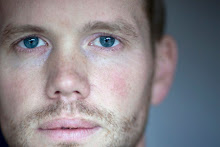“It is all about being stupid so that the audience can be intelligent”João Evangelista (Portugal/The Netherlands) majored in Artificial Intelligence and Logic Systems Theory, before completing the School for New Dance Development in Amsterdam (where he studied choreography, performance art and directing). He makes live performances, theatre, dance and everything that falls in between. When seen his work, the public is never static, but is always invited to participate in one way or another. For Festival a/d Werf 2010, he will present We hope you (or why there are no butterflies in winter). He started working on this piece last year, as an artist in residence at Huis a/d Werf, after his last work ‘The End Must Go On (or how to survive midnight without becoming a pumpkin in 10 easy steps)’, a 6 hours durational performance presented at Pact-Zollverein, Essen (DE).
At which stage of your creative process are you at the moment?
When the residency was taking place, we were finding the work by doing it. Now the work is done, the 'machine' is ready. What I am currently doing is dismembering the machine into parts, and I'm looking at how the different parts make the motive behind of the work emerge.
Through this performance, I want people to experience the three basic mechanisms of hope, which are derived from the philosophy of Ernst Bloch: awareness of the not yet, of what is to come; daydreaming, which is imagining beyond what is already there; and a perception shift where both things come together. So I am focusing to understand which part of the performance, of the 'machine', can better trigger each of these mechanisms and how it actually does that.
How do you test these things?
For the moment, it is just me, the philosopher Elisabeth Boender, and the and the artist I invited for the collaborative process Yen Yi-Tzu, looking at documentation of the work, mapping it and understanding it from the outside. Later on, I'll rehearse it and have open showings to see how it actually works.
'Hope' appears to me to be something very subjective, how can you trigger it as a collective experience in the audience?
I just want people to experience the three basic mechanisms that hope requires. Instead of aiming at big words or the big concepts, such as Hope, I aim at deconstructing it into smaller mechanisms as I told you about. If the audience, through these three mechanisms, can experience hope, that would be great. But I couldn't do the whole work for the audience. I can trigger things, but that's about it. How they take it is up to them.
You mentioned Bloch before. The work which you are doing is partially inspired in a philosophical investigation, but I understand that you don't want to make it an obscure and intellectual piece. How do you aim to achieve this?
By making it very naive. My own philosophical reflections should stay in the studio, or presented as an end publication, something very usual in the field of fine arts, but not theater. There is a simplification of the complexities. I want to understand what kind of language operates in which way. When we look for banal and absurd locations, places that can trigger day dreaming, for example. It is all about being stupid so that the audience can be intelligent. We research all these theories but we replace them with things that are very simple, almost on the edge of being silly and naïve, that belong to the everyday life, but reflect the seriousness of the subject I approach.



No comments:
Post a Comment